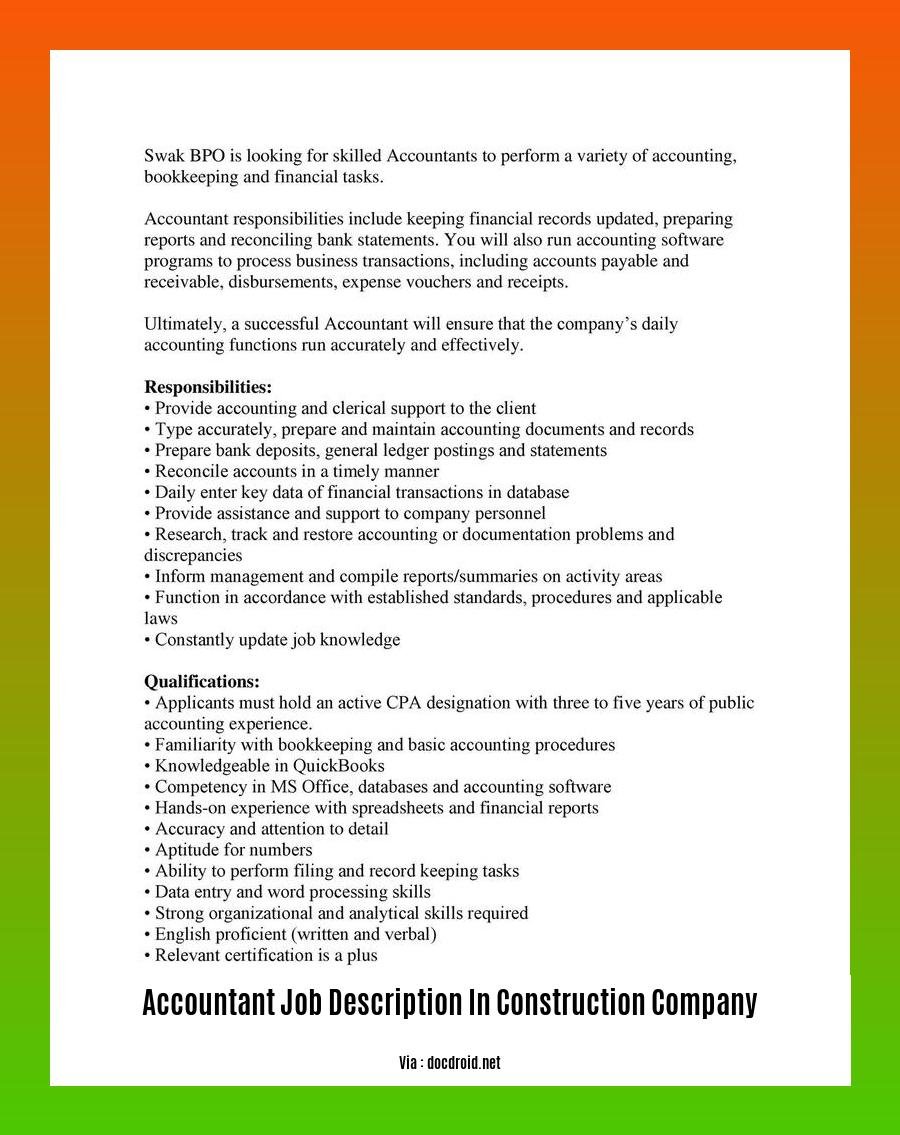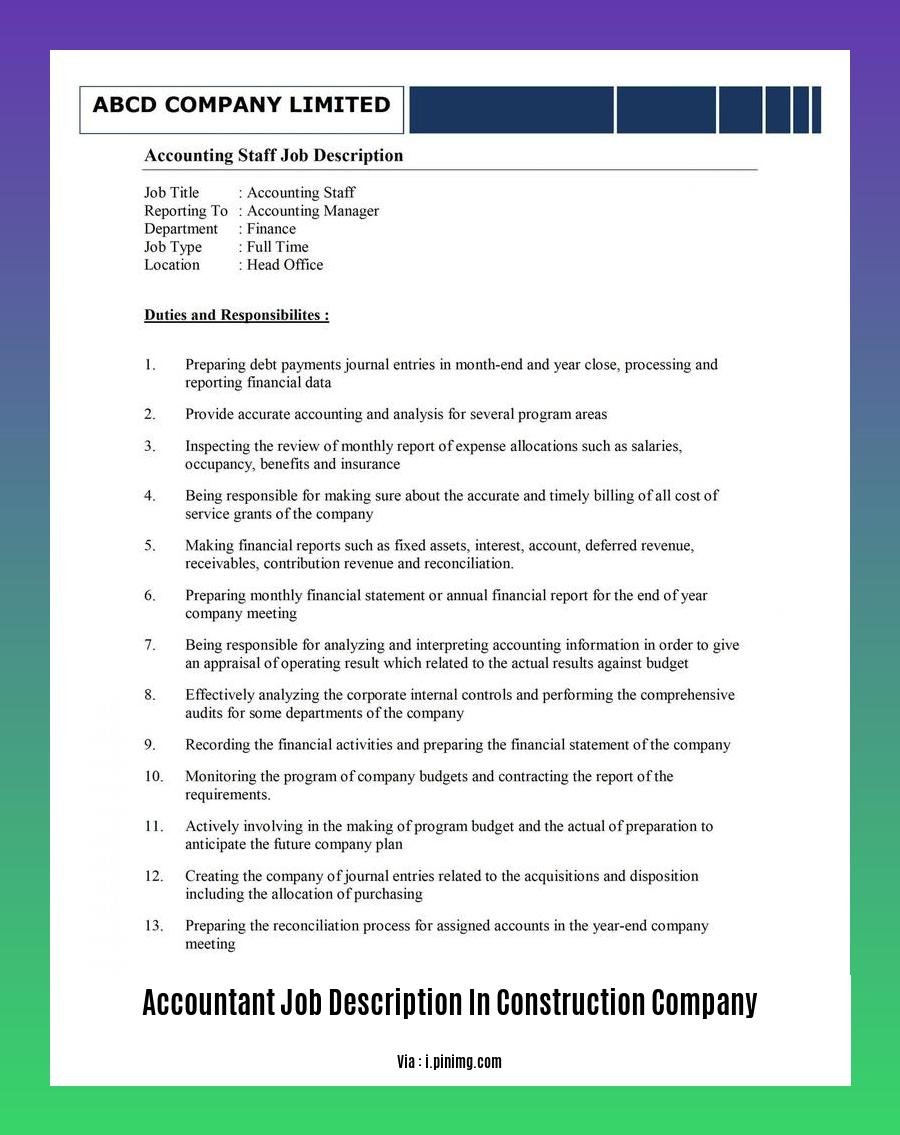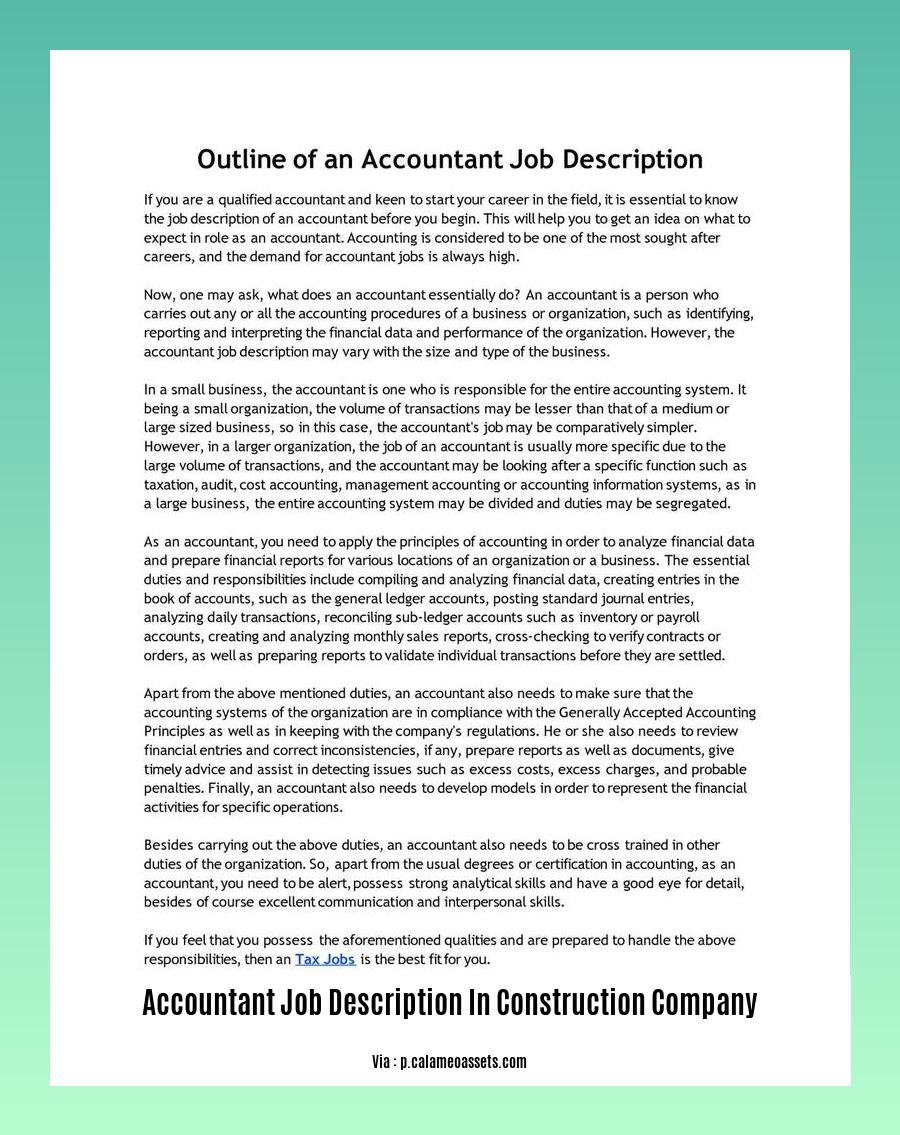In a construction company, meticulous accounting practices are essential for smooth operations and long-term success. The Accountant Job Description in Construction Company outlines the key responsibilities, skills, and qualifications required to effectively manage the financial aspects of construction projects.
Key Takeaways:
- Assist in creating cost-effective budgets with project managers.
- Handle accounting tasks (e.g., invoices, cash flow estimates, purchase order approvals).
- Analyze transactions and adjust budgets for unexpected costs.
- Maintain financial records related to projects for audits and taxes.
Accountant Job Description in Construction Company

In a construction company, an accountant plays a crucial role in managing financial operations and ensuring the smooth execution of projects. Their responsibilities encompass a wide range of accounting tasks, including:
- Collaborating with project managers to establish realistic and cost-effective budgets.
- Preparing invoices, estimating cash flow, and authorizing purchase orders, ensuring accurate financial tracking.
- Analyzing transactions, adjusting budgets for unforeseen expenses, and minimizing financial risks.
- Maintaining detailed financial records for auditing and tax compliance purposes.
Accountants in construction companies require a strong understanding of accounting principles, construction industry-specific regulations, and project management best practices. They must possess excellent analytical and communication skills to interpret financial data, identify trends, and effectively communicate with project teams.
The following steps outline the general responsibilities of an accountant in a construction company:
-
Collaborate and Plan: Work closely with project managers to understand project objectives, develop budgets, and ensure alignment with financial goals.
-
Manage Financial Operations: Perform core accounting tasks, including invoice processing, cash flow management, and purchase order authorization.
-
Analyze and Report: Regularly analyze financial data, prepare reports, and provide insights to management on project profitability, cost variances, and financial performance.
-
Maintain Records and Compliance: Maintain accurate financial records for auditing purposes and ensure compliance with tax regulations and industry standards.
-
Consult and Advise: Provide financial guidance to project teams, advise on cost-saving measures, and contribute to decision-making processes.
By fulfilling these responsibilities, accountants play a vital role in supporting the financial success of construction projects and contributing to the overall profitability of the company.
- Abu Dhabi is a hub for construction companies, and you can find a list of the top ones here.
- For a list of contracting companies in Abu Dhabi, click here.
- To find active construction sites near you, visit this page.
- If you’re interested in AI for construction estimating, learn more here.
- For the contact number of Arabian Construction Company, visit this page.
- To know more about Arabian Construction Company in Dubai, United Arab Emirates, click here.
Duties and Responsibilities of a Construction Accountant

Construction accountants play a crucial role in the success of construction projects by expertly managing financial matters. Their responsibilities are wide-ranging, ensuring the smooth operation and profitability of construction endeavors.
Key Takeaways:
- Budgeting and Cost Analysis: Construction accountants prepare realistic budgets and conduct thorough cost analyses to optimize project spending.
- Contract and Order Management: They meticulously review contracts and purchase orders to ensure accuracy and compliance.
- Financial Reporting and Analysis: Accountants maintain detailed accounting files, perform monthly closings, and produce comprehensive financial reports for project monitoring and decision-making.
- Billing and Invoicing: They handle billing and invoicing, ensuring timely payments and accurate financial tracking.
- Financial Insights: Construction accountants provide valuable financial insights to project managers and company executives, guiding strategic decisions for project execution.
- Cash Flow Management: They monitor cash flow, forecast future financial needs, and identify areas for optimization.
- Regulatory Compliance: Accountants maintain a strong understanding of accounting principles and industry practices, ensuring compliance with applicable regulations and standards.
Sources:
- Accountant Job Description – Betterteam
- Accountant Job Description – Job Description and Resume Examples
Working Conditions
Working conditions play a vital role in the construction industry. Here’s a glimpse into the working environment of an accountant in this field:
Physical Environment:
- Construction sites can be physically demanding, with exposure to noise, dust, and hazardous materials.
- Accountants often work in offices at construction companies or project sites, with potential exposure to these elements.
Hours and Flexibility:
- Construction projects can have tight deadlines, requiring accountants to work extended hours or irregular schedules.
- Flexibility and adaptability are crucial in managing the demands of the job.
Travel Requirements:
- Accountants may need to travel to different project sites, sometimes requiring overnight stays.
- The frequency and duration of travel depend on the company and project.
Mental and Emotional Demands:
- The construction industry is fast-paced and competitive, which can create a high-stress work environment.
- Accountants must be able to handle pressure, meet deadlines, and work independently.
Key Takeaways:
- Physical and mental demands: Construction accountants work in physically and mentally challenging environments.
- Flexibility and adaptability: Extended hours, irregular schedules, and travel requirements are common in this field.
- Stress and pressure: Tight deadlines and a competitive industry can contribute to stress.
- Collaboration and communication: Accountants collaborate with project managers and other professionals throughout the project lifecycle.
Sources:
- Construction Accountant Job Description – Betterteam
- What does a Construction Accountant do? – Glassdoor
Payroll and Benefits
Payroll and benefits are crucial aspects of any construction company. The following paragraphs will delve into the responsibilities, qualifications, and salary expectations of a payroll and benefits accountant in the construction industry.
Responsibilities
- Payroll Management: Establishing employee payroll records and performing necessary calculations for wages and salaries.
- Benefits Administration: Setting up and managing employee benefits such as health insurance, retirement plans, and paid time off.
- Vendor Management: Calculating and reconciling amounts due to vendors and distributing payments.
- Record Maintenance: Maintaining accurate and up-to-date payroll and benefits records for audits and reporting purposes.
Qualifications
- Education: Bachelor’s degree in accounting or a related field.
- Experience: 2+ years of experience in payroll and benefits accounting, specifically within the construction industry.
- Skills: Proficiency in payroll and benefits accounting software, strong attention to detail, and excellent communication skills.
Salary
According to Indeed, the average salary for a payroll and benefits accountant in the United States is $69,495 per year.
Key Takeaways:
- Payroll and benefits accountants handle the financial responsibilities related to employee compensation and benefits.
- The construction industry requires specific skills and knowledge in payroll and benefits accounting.
- The average salary for a payroll and benefits accountant varies based on experience, location, and company size.
Relevant Resources:
FAQ
Q1: What are the primary responsibilities of a Construction Accountant?
Q2: What educational qualifications and experience are necessary to become a Construction Accountant?
Q3: What is the average salary range for a Construction Accountant?
Q4: What are the key skills and software proficiency required for a Construction Accountant?
Q5: What are the potential career growth opportunities for a Construction Accountant?
- Decorative Backsplash Ideas: Colorful Kitchen Transformations for Your Home - November 13, 2025
- Choosing Backsplash Materials: Ideas for Kitchen and Bathroom Designs - November 12, 2025
- Kitchen Backsplash Tile Patterns: Find Your Perfect Style - November 11, 2025










